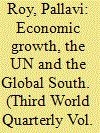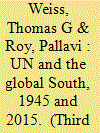| Srl | Item |
| 1 |
ID:
145879


|
|
|
|
|
| Summary/Abstract |
The most visible success of the UN system has been to foster a multilateral structure of international governance that has proved resilient since World War II. However, this structure has failed to provide a financing mechanism to help developing countries achieve the structural transformations required for broad-based economic growth. Indeed, the Global South has also had many chances to reorder the international financing system but has failed thus far to do so. The global distribution of power remains with the USA and the West; even rising China plays by the contract-enforcement rules of the North in terms of global economic governance. Another critical reason why financing has not been readily available, despite the magnitude of capital flows between developed and developing economies, is that it comes with conditions that induce little ‘effort’ to result in capability development. Policies should be devised to overcome this weakness but they are unlikely within a multilateral framework. However, if the USA and China agree to work together on alternative multilateral systems promoted by the Global South, the potential for positive change increases.
|
|
|
|
|
|
|
|
|
|
|
|
|
|
|
|
| 2 |
ID:
145870


|
|
|
|
|
| Summary/Abstract |
The United Nations is hardly a popular pursuit in today’s academic and policy literatures, and so it is unsurprising that an examination of that multilateral structure before 1945 shows an even more egregious absence of analytical attention. Such ignorance conveniently ignores the forgotten genius of 1942–45, namely in the wide substantive and geographic relevance of multilateralism during World War II and in the foundations for the contemporary world order. This collection of papers critically reviews the worlds of 1945 and 2015, of then and now, to determine the role of continuity and change, of the ongoing bases for compromise, and for the clashes between the Global South and Global North.
|
|
|
|
|
|
|
|
|
|
|
|
|
|
|
|